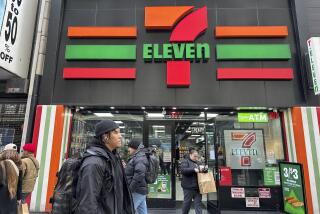Coniston Offers $1.3 Billion for TW Services, Parent of Denny’s Chain
- Share via
A New York investment firm on Thursday launched a takeover bid valued at $1.3 billion for the company that owns Denny’s coffee shops, the Hardee’s hamburger chain and El Pollo Loco restaurants.
The bid for TW Services, which also owns the Canteen food service firm and 42% of Winchell’s Donut Houses, comes 13 months after TW acquired Denny’s for $850 million.
The $28-a-share offer for New York-based TW comes from Coniston Partners, which last month said it had purchased about 19% of the food service company’s stock and was interested in purchasing the rest of firm. Coniston recently came away with a $52-million profit in an unsuccessful effort to gain control of Gillette Co.
Gus Oliver, a Coniston general partner, said his group had met with TW management last week to discuss a possible takeover. “They said they were not interested in doing so,” Oliver said. “Since we were, we felt that it was necessary to make a more formal kind of offer.”
In a letter to TW, Coniston said that while it considered the offering price to be “full and fair,” it was “willing to consider offering more if (TW) can demonstrate sufficient business prospects to justify doing so.”
TW President Jerry J. Richardson said his company’s board would meet this week to review Coniston’s offer. “I spoke to Paul Tierney (Coniston’s managing partner) myself this morning,” Richardson said Thursday. “I told him he had to do what he had to do and we have to do what we think is best for our shareholders.”
On the New York Stock Exchange, TW stock jumped $1.75 a share to $26.625 in afternoon trading. Analysts said the $28-a-share offer was at the low end of estimates of what the company was worth.
In the past, TW has indicated that it wants to remain independent and has adopted anti-takeover measures, said Lloyd Rixe, a securities analyst at D. A. Davidson & Co., a Montana brokerage firm. “It will be difficult to take this company over without a friendly response from management,” he said.
Analysts describe TW, which reported $47.1 million in 1987 profit on $2.5 billion in revenue, as a well-managed company that has boosted profits at once lagging Denny’s--now the company’s largest division. TW has laid off 10% of Denny’s work force and has introduced new marketing and advertising campaigns. The company has plans to boost the size of the 2,100-unit coffee chain--and El Pollo Loco--mostly through franchises as opposed to opening company-owned restaurants as was the done under previous managers.
“They have brought Denny’s into a good, profitable position well ahead of schedule,” Rixe said.
But “the reason why it’s vulnerable to a takeover is that it really has three distinct pieces” Rixe said of the firm’s Denny’s, Hardee and Canteen divisions. “Those pieces are easily separable.”
Coniston was offering $28 a share--or $1.1 billion--for the 39.27 million TW shares it does not already own. Coniston paid an average $19 a share--or $176.2 million--for the 9.28 million TW shares purchased during several days in September. About 7.2 million of those shares had belonged to takeover specialist Ronald O. Perelman, chairman of Revlon Inc.
Oliver said Coniston plans to keep the TW restaurant and food services businesses and indicated that it might sell the small health service division. ‘We intend to keep current core business--the restaurant and food service businesses,” he said.
“We think that the restaurant and food service business are good solid businesses,” Oliver said. “They are solid businesses that are likely to grow over time. We would work with either operating management or find other managers to run the company.”
Coniston said TW is a potential candidate for a leveraged buyout. In such a buyout, Coniston would borrow money using TW to secure the loans. Then, the loans would be repaid with cash generated by TW’s operations or the sale of assets.
Coniston has a track record of buying chunks of companies’ stock and then forcing changes aimed at boosting the price of the shares. In August, Coniston made a $52-million profit after selling part of its stock in Gillette Co. back to the consumer products corporation.
More to Read
Inside the business of entertainment
The Wide Shot brings you news, analysis and insights on everything from streaming wars to production — and what it all means for the future.
You may occasionally receive promotional content from the Los Angeles Times.










